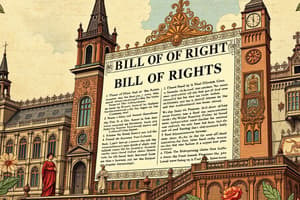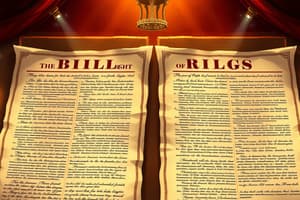Podcast
Questions and Answers
What does the term 'democracy' derive from in Greek?
What does the term 'democracy' derive from in Greek?
- Demos and oligarchia
- Demos and theos
- Demos and polis
- Demos and kratos (correct)
Who were the citizens allowed to participate in the decision-making process in Athens?
Who were the citizens allowed to participate in the decision-making process in Athens?
- Wealthy landowners
- Any male resident over 18
- Adult male residents only (correct)
- All residents of Athens
What significant event occurred around 600 B.C. in Athens that prompted leadership changes?
What significant event occurred around 600 B.C. in Athens that prompted leadership changes?
- A cultural renaissance
- Severe economic problems (correct)
- A military invasion
- A major agricultural revolution
What actions did poor farmers take in response to economic hardships in Athens?
What actions did poor farmers take in response to economic hardships in Athens?
What was the role of the three nobles elected each year in Athens?
What was the role of the three nobles elected each year in Athens?
What was one of the key restrictions placed on the monarch by the English Bill of Rights?
What was one of the key restrictions placed on the monarch by the English Bill of Rights?
Which of the following rights was guaranteed to English citizens under the English Bill of Rights?
Which of the following rights was guaranteed to English citizens under the English Bill of Rights?
Which historical document is credited with beginning the process that culminated in the English Bill of Rights?
Which historical document is credited with beginning the process that culminated in the English Bill of Rights?
How did the English Bill of Rights impact the structure of government in England?
How did the English Bill of Rights impact the structure of government in England?
What type of punishment was specifically forbidden under the English Bill of Rights?
What type of punishment was specifically forbidden under the English Bill of Rights?
Flashcards are hidden until you start studying
Study Notes
Powers of the Ruler
- The Constitution and laws restrict the power of rulers to ensure governance is accountable.
English Bill of Rights (1689)
- Established by William and Mary, it formalized the essential rights and liberties of the people.
- Limited the monarchy's power by prohibiting suspension of laws, taxation without Parliament's consent, and army formation in peacetime without approval.
- Guaranteed the right to petition the king for grievances, while forbidding excessive bail and cruel punishment.
- Emphasized frequent meetings of Parliament to address grievances and strengthen laws.
Legacy of the English Bill of Rights
- The Glorious Revolution and the Bill of Rights led to the establishment of rule of law, parliamentary governance, individual liberties, and a constitutional monarchy in England.
- This marked a completion of a process initiated by the Magna Carta, foundational for modern democracy.
Building Democracy in Ancient Athens
- Athens emerged as a powerful city-state where adult male citizens participated in governance.
- An assembly was elected annually, where nobles ruled and later became adviser council members.
- Economic crises led to social strife, with farmers pledging crops and lands, eventually falling into slavery due to debt.
Cleisthenes' Reforms
- Cleisthenes, around 508 B.C., is recognized as the founder of Athenian democracy.
- He reorganized the assembly to balance power among citizens, increasing participation by allowing them to propose laws.
- Established the Council of Five Hundred, chosen randomly among citizens, to propose laws and advise the assembly, promoting limited democracy.
Decline of Athenian Democracy
- Democracy in Greece ended after the conflict between Athens and Sparta, leading to a Macedonian invasion that weakened city-states.
Greek Philosophers and Reason
- Fourth-century B.C. Athens saw great philosophers, including Socrates and Plato, who explored the universe and human morality through reason and logic.
- Socrates employed the Socratic method, encouraging critical examination of beliefs.
- Plato, in "The Republic," advocated for governance by philosopher-kings, prioritizing wisdom over wealth.
Roman Republic Development
- As Greece declined, Rome developed through conflicts among Latins, Greeks, and Etruscans from 1000 to 500 B.C.
- The Roman Republic was established in 509 B.C. after aristocrats overthrew a monarchy, marking a shift to a government where citizens elect leaders, defining indirect democracy.
Studying That Suits You
Use AI to generate personalized quizzes and flashcards to suit your learning preferences.




